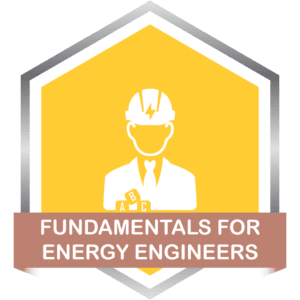About Course
Functionality of the Measurement and Verification Specialist

Measurement and verification (M&V) is the process of designing, measuring, collecting, and evaluating data to confirm energy savings inside a facility as a result of implementing one or more energy conservation measures.
A variety of activities, such as energy data estimation and measurement, meter use, data gathering and monitoring, and report validation, contribute to this. Individuals that specialize in M&V can frequently assist a company in implementing cost-saving initiatives for a wide range of structures, including existing, new, and industrial facilities, by maintaining open contact with project partners.
A Certified Measurement and Verification Specialist (CMVS) administers or implements internationally recognized procedures for assessing the energy usage consequences of energy management operations. They use the core ideas of performance and savings substantiation in a range of settings, such as utility and government incentive programs and energy savings performance contracts. A CMVS can commonly help a company confidently and cost-effectively implement cost-saving actions by maintaining open contact with project associates.
The Functionality of the Measurement and Verification Specialist training program teaches students about different situations, ideas, practical issues, system boundaries, extra baseline considerations, granularity and load shapes, statistics, fieldwork, OSHA, NFPA, data accessibility, reporting on M&V projects, IPMVP options, the future of measurement and verification, sample plans and reports, and ESCO’s Guide and protocols.
The functionality of the Measurement and Verification Specialist course imparts fundamental knowledge across several core principles and practices specific to measuring, verifying, and reporting energy performance. This is ensured by the presentation of the following sections:
- Introduction and course outline.
- Contexts and Concepts: M&V Specialist’s Function.
- Standards of practice.
- Practical considerations for M&V.
- Physical and statistical models.
- System boundary in M&V.
- Baseline: Additional Considerations.
- Implementing baseline models and data.
- Granularity and load shapes.
- Using statistics to communicate uncertainty.
- Instrument metering and calibration.
- Fieldwork: accreditation, safety, OSHA, NFPA.
- Data accessibility, communication, and valuation.
- Reporting on M&V projects.
- Definitions of IPMVP Options.
- Future of measurement and verification.
- Sample M&V plan and report.
- ESCO’s Guide to Measurement and Verification.
- Sample practice exam questions
A Certified Measurement and Verification Specialist (CMVS) is someone who uses the ideas of measurement and verification to figure out how energy management activities improve the performance of a wide range of systems that use energy, such as buildings or industrial processes.
Krishnaji Pawar, CEO and founder of Beyond Smart Cities, is creating the Functionality of the Measurement and Verification Specialist training course, specializing in sustainable design strategies for green building certification systems, energy management, energy audits, building commissioning, and environmental impact assessments.
The CMVS Certification certifies an individual’s understanding of M&V theory implementation and enhances professional standards in energy efficiency and performance measurement and verification. The certification includes a 100-question practice exam and unique tools to help energy management professionals create customized study plans and achieve professional development goals. These tools ensure the effectiveness of measurement and verification specialists.
CMVS Certification Value
- Wide-reaching, industry-recognized certification.
- Enhances career prospects through higher pay, increased responsibilities, and benefits.
- Provides knowledge and technical application of energy management, measurement, verification, and efficiency processes.
- Prioritizes professional growth and development.
- Enhances professional credibility.
- Increases job opportunities.
Other Related Courses
Certified M&V Professional – CMVP Exam Question Bank
The Certified Measurement and Verification Professional – CMVP Exam Question Bank aids energy management and efficiency professionals in creating personalized study plans to achieve professional development goals.
Key Learning Objectives
- Over 800 questions in eight practice exams.
- Understanding reasoning and related knowledge areas.
- Familiarity with energy management acronyms.
- Recognizing strategies and making smart choices.
- Experimenting with the CMVP exam.
- Responding to circumstances.
- Consideration of practice test as part of education.
- New CMVP: 162+ Key Terminology Flash Cards.
Course Content
Section 1: Introduction and Course Outline
-
25:32
-
L1_13CMVSiC_CMVS_Fuctionality – Handout
Section 2: Contexts and concepts: The function of the M&V specialist
Section 3: Standards of Practice
Section 4: Practical Considerations for M&V
Section 5: Physical and statistical models
Section 6: System Boundary in M&V
Section 7: Baseline: Additional Considerations
Section 8: Special Baseline Considerations for Utility Programs
Section 9: mplementing the Baseline Model and data from the reporting period
Section 10: Granularity and load shapes
Section 11: Using Statistics to Communicate Uncertainty
Section 12: Metering and calibration of instruments
Section 13: Fieldwork: formal accreditation, safety, OSHA, and NFPA
Section 14: Data accessibility, communication, and valuation
Section 15: Reporting on Measurement and Verification (M&V) Projects
Section 16: Definitions of IPMVP Options
Section 17: The future of measurement and verification
Section 18: Sample M&V Plan
Section 19: Sample M&V Report
Section 20: ESCO’s Guide to Measurement and Verification
Section 21: Summary and Resources
Certified Measurement and Verification Specialist – Practice Test V5.1
Student Ratings & Reviews



